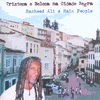
Today, November 20Th, is the National Day of Black Consciousness in Brasil.
For millions of Brasilians this is a day of great pride, a day of black awareness (consciência negra) in the nation that held the most enslaved Africans in the Americas, where legal slavery lasted until 1888.
It is the day, in 1695, when Rei Zumbi dos Palmares was captured and beheaded by the Portuguese military for leading the greatest Maroon colony (Quilombo) of escaped Africans in the Americas. One hundred and ninety-three years before the abolition of slavery in Brasil, the barbarous Portuguese took Zumbi's head and displayed it in the city of Recife 's main plaza so that enslaved Africans would know that he was not immortal. Still, they could not kill his legend nor the legacy of the Palmares settlement over which he ruled at the time of his death.
Founded sometime in 1630, during the war between the Dutch and the Portuguese, the maroon settlements in the highlands of of Alagoas proved to be a place of sanctuary for many enslaved Africans who took advantage of the confusion of war to escape. Among them was a man from Angola who is now known by the honored title of Nganga Zumba. As head of the council of villages which became known as Palmares or Angola Janga (New Angola), Nganga Zumba was regarded as the patriarch or king of the settlement. By 1670, the community had grown into a small nation-state of approximately 30,000. The quilombo had to stave off many attacks by the Portuguese army but in 1678 Nganga Zumba, tired of the constant warfare, accepted a peace treaty that required that they relocate. His acceptance of the treaty caused a split among the community and led to Nganga Zumba being poisoned. Those who accepted the treaty and relocated were summarily re-enslaved! Nganga Zumba's nephew, Zumbi, had opposed the treaty and he was taken as king by those who decided to stay in Palmares. Zumbi valiantly led the quilombo of Angola Janga for fifteen years against Portuguese attacks until he was defeated in 1694. Forced into hiding and wounded after the defeat, Zumbi continued to fight as an insurgent against the Portuguese for nearly two years until his hideout was betrayed.
































